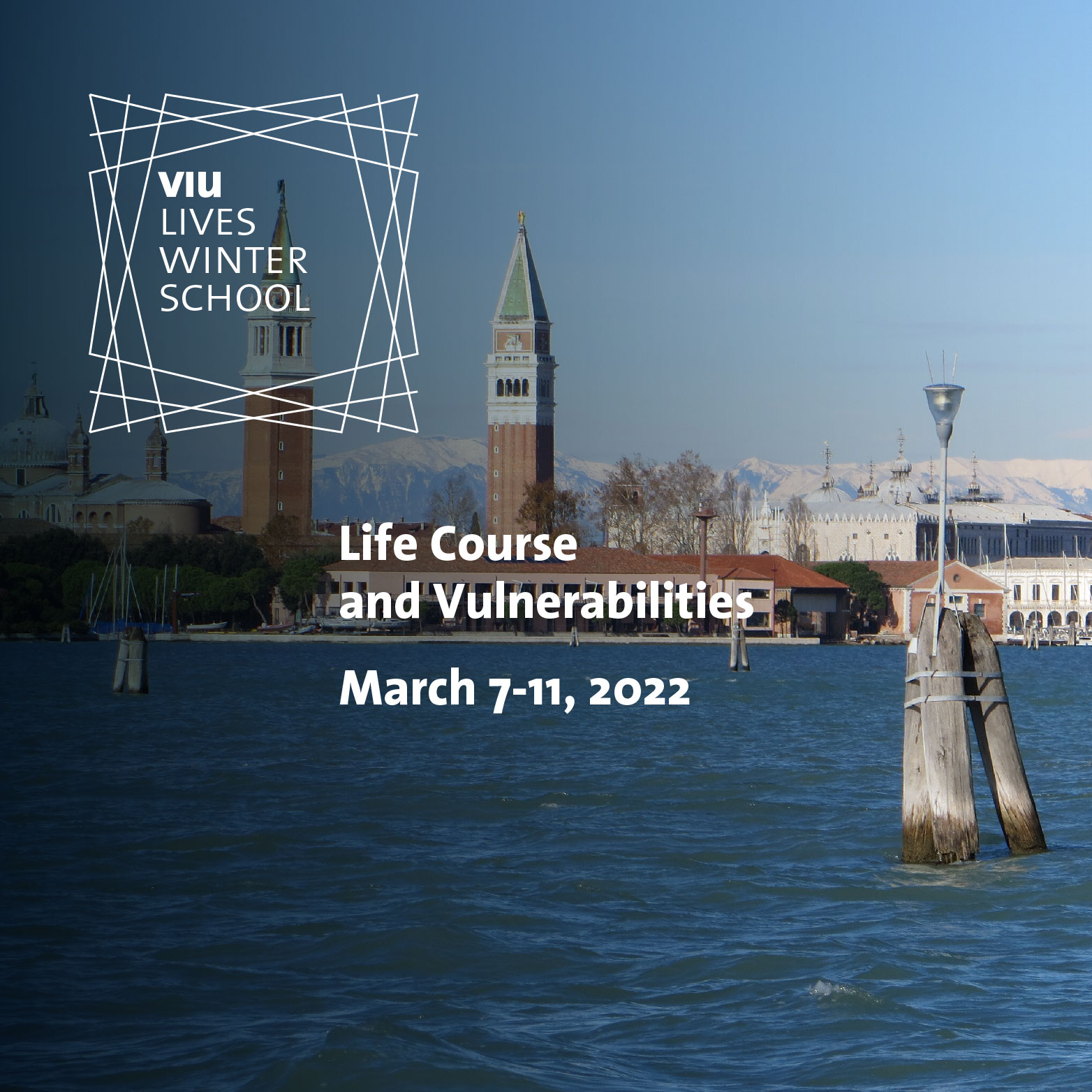March 7-11, 2022
This is the seventh edition of the LIVES Winter School, the third organized by Venice International University and led by the University of Lausanne.
During an intensive one-week program, doctoral students and young researchers will work on various fields of Life Course research through a multidisciplinary approach (Sociology, Psychology, Social Psychology, Life-span Psychology, Social Demography and Social Policies) led by internationally renowned experts.
In particular, the Winter School will focus on training the participants in the drafting of research projects or journal articles as a fundamental aspect of the academic career they are approaching. With a “learning -by-doing” approach, participants will go through all stages of these drafting processes.
Who is it for?
The School first targets PhD students, but postdoc researchers can also apply.
Disciplines involved are Psychology, Sociology, Social Psychology, Life-span Psychology, Social Demography and Social Policy, Statistics and Socioeconomics, depending on the tutors and the workshop contents. The common topic of the workshops is vulnerability across the life course.
Thematic workshops:
1. Trajectories of regularized migrant workers in Geneva, Switzerland
Migrant workers without residency permit, known as undocumented, tend to live in precarious conditions and to be exposed to an accumulation of adverse determinants of health. In the context of a regularization policy (Opération Papyrus) taking place in canton of Geneva in 2017-2018, a longitudinal mixed-methods study aiming at measuring the impact of obtaining a residency permit on health and well-being was developed. The Parchemins study compares over time a group of adult undocumented migrants in the process of regularization with a group of undocumented migrants who lack one or more eligibility criteria for regularization (control group). The workshops aims at developing publication(s) with the students, analyzing the available data along specific research questions related to trajectories of undocumented and regularized migrants.
Tutors
Claudine Burton-Jeangros, LIVES Centre, University of Geneva
Yves Jackson, LIVES Centre, University of Geneva
Aline Duvoisin, LIVES Centre, University of Geneva
Piotr Plewa, Duke University (Keynote)
2. Is there a gender data gap in survey research? Neglect of female health aspects and their connection to vulnerability
The ‘gender data gap’ refers to the absence of data on women and the consequent ‘silence’ around women’s everyday lives, experiences and needs. Gender data gaps are ubiquitous and have important consequences for women and girls across a vast range of domains and outcomes.
This workshop will investigate one particular health domain contributing to the ‘invisibilisation’ of women’s everyday experiences of vulnerability, as well as an incomplete picture of causes of vulnerability across the life course: the impact of gynecological health. Assessing the true extent of this data gap and exploring ways to address it, therefore, represent important priorities for research into gender, health, and vulnerability.
Tutors
Caroline Roberts, LIVES Centre, University of Lausanne
Daniela Jopp, LIVES Centre, University of Lausanne
Charikleia Lampraki, LIVES Centre, University of Lausanne
Heather O’Mahen, Exeter University (online Keynote)
3. Networked Lives
Our lives are lived in networks. Through our personal contacts —family, friends, classmates, co-workers, neighbors, acquaintances— we make sense of the world around us and access many fundamental resources: information, advice, knowledge, practical and emotional support. These resources, an authentic (social) capital, influence our social position and well-being in key areas of life (i.e., work, family, leisure, health) and play a major role in the unfolding of the transitions that make up our personal trajectories. This workshop explores these relational aspects of the life course, explaining how many inequalities can be understood by studying the convoy of relationships surrounding us: who are our contacts? Why are they in our lives? Do they help us? How? Why?
The workshop is divided into two blocks to address these issues from a theoretical and empirical point of view, and ends with a session dedicated to the initial drafting of a manuscript in which the essential outlines of a publication are proposed: research questions, theoretical foundation, data collection and analytical strategy.
Tutors
Dario Spini, LIVES Centre, University of Lausanne
Mattia Vacchiano, LIVES Centre, University of Geneva
Eric Widmer, LIVES Centre, University of Geneva
Credits
Certificate of attendance will be issued at the end of the course.
ECTS credits equivalence: 2
Fees
Students of VIU member universities: € 400
LIVES Doctoral Program and its affiliated member universities: € 600
Students of other universities: € 800
VIU Alumni are eligible for a reduced fee.
The fees will cover tuition, course materials, breakfasts and lunches, accommodation on the VIU campus on the Island of San Servolo in single rooms with private bathroom, and a social event. Participants will be responsible for covering their own travel expenses to and from Venice and local transportation.
PhD candidates and post-docs from EU universities may be eligible for Erasmus+ mobility grant support. Candidates should consult the International Office in their own university for information about the calls for applications for funding. VIU will provide any supporting documentation requested for such applications. Contact VIU Erasmus office: erasmus@univiu.org
Admitted candidates will be notified by January 31 and should pay the fees by February 6, 2022.
For further information: summerschools@univiu.org
As the COVID-19 pandemic is ongoing, VIU will continue to monitor the situation; should it prevent international travel or the confirmation of the program on campus as scheduled, other practicable solutions will be evaluated. Applicants and confirmed participants will be informed of any changes.
Co-organizers
Venice International University (IT)
University of Lausanne & University of Geneva - Swiss National Center of Competence in Research LIVES (CH)
Affiliated institutions
Bremen International Graduate School of Social Sciences (BIGSSS), University of Bremen & Jacobs University (D)
Hallie Ford Center for Healthy Children & Families, Oregon State University (USA)
Centre for Population, Aging and Health, Western University (CA)
Centre for Demographic and Ageing Research (CEDAR), Umeå University (SE)





























